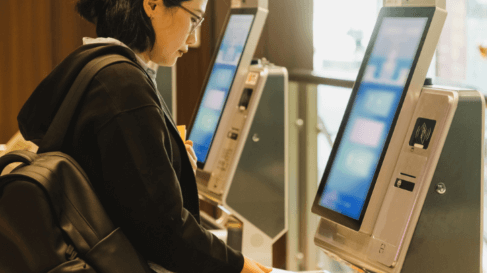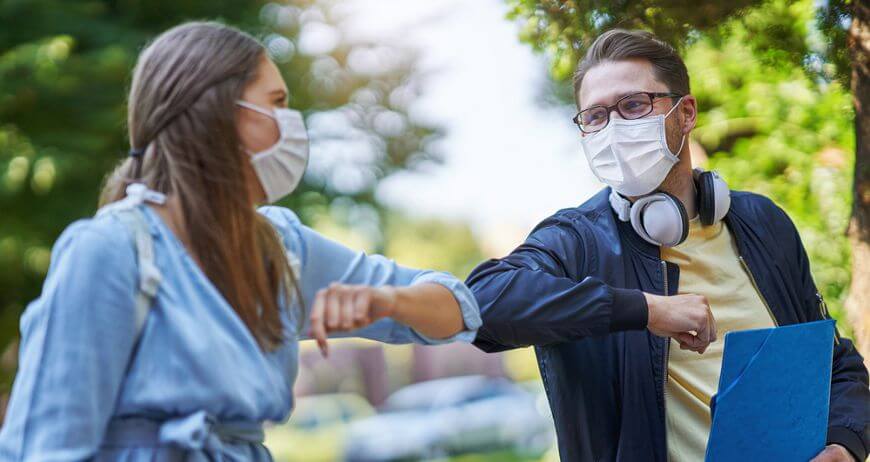Sarah Richardson, Group Editor, Research Professional News
As a second surge of coronavirus cases sweeps across Europe, governments and universities alike have been grappling with the question of whether to keep universities open for face-to-face teaching.
In France, the government has taken the decision out of universities’ hands. At the end of October, president Emmanuel Macron announced that universities would be expected to close their campuses to almost all students until 1 December and switch to online learning, although institutions will remain open to researchers.
By contrast, in England, the government has said it “expects face-to-face teaching to continue” in the country’s second national lockdown—provided it can be done “in a COVID-secure way”. This puts the onus heavily on universities to find ways to protect their staff and students, whilst keeping their doors open if they possibly can.
For universities like those in England, which have a choice to make, striking the right balance between in-person and remote contact is an extremely tough call. In the middle of an academic term, universities have responsibilities to the education and mental health of students, many of whom are currently based in their university towns; to staff; to local communities; and to the long-term future of their institutions. The best approach for each of these groups is also far from clear-cut.
Research Professional News has recently published the results of a survey of more than 300 university professionals in the UK, carried out in October, which shows that the vast majority —78 per cent—believe their campus cannot be made “COVID-secure.”
Despite this, there was a reasonable level of support overall for the universities’ response to the pandemic, with an average ranking of 3.5 out of 5 for the steps taken. Perhaps tellingly, the second-biggest concern among our respondents, after job security, was access to laboratories—support for full university closures is extremely thin on the ground.
Keeping universities open, however, comes at significant financial cost. As an investigation by Research Professional News shows, many of the UK’s Russell Group of research-intensive universities have already spent well over £1m ($1.3m) on alterations to make their campuses “COVID-secure.” One prestigious London institution estimates it will spend more than £14m ($18.2m) on creating a safe campus this academic year.
COVID-19 Global News Round Up
Here are the latest headlines in COVID-19 research policy and funding, from our team of journalists at Research Professional News.
Worldwide
The United Nations’ health, science and human rights agencies have declared access to science a fundamental right as they accelerate work on open science due to the COVID-19 pandemic.
United States
An analysis of how COVID-19 has affected the research system in the US has found that the biggest disruptions have been to researchers and students themselves, while the impact on institutions is largely unknown. Funding is likely to remain stable, the study by Jane Radecki and Roger Schonfeld of the academic digitization charity Ithaka S+R found.
Thirty-four Democrat senators have signed a letter to education secretary Betsy DeVos, calling on her to broaden the scope of student debt relief under the Cares Act, which offers financial support for dealing with COVID-19.
Europe
The EU research, innovation and education commissioner Mariya Gabriel has started participating in virtual work appointments again, following a week in which her appointments were cancelled after she announced testing positive for COVID-19 on 10 October.
An EU-funded research project has received the green light from Italy’s pharmaceuticals regulator to start a clinical trial of a possible treatment for COVID-19.
The European Commission has a plan to bring experts on COVID-19 from different European countries together to facilitate better sharing of information on how to combat the pandemic, as hospitalization rates across the EU soar in the wake of a second wave of cases.
Higher education institutions should look at a broad menu of income options to weather the “financial difficulties” they could face for years as a result of the COVID-19 pandemic, the European University Association has recommended.
The Irish government has offered a rescue deal supporting researchers and doctoral students whose work has been impacted by the COVID-19 pandemic.
United Kingdom
National funder UK Research and Innovation has announced an £88 million investment to modernize and expand research laboratories and facilities in light of the COVID-19 pandemic.
The pandemic could lead to a shortfall of nearly £8 billion in funding for medical research in the UK over the next few years, a leading think tank has warned ahead of the government’s one-year spending review.
The University and College Union is launching a legal challenge over the UK government’s decision to reject scientific advice to move most teaching online to slow the spread of COVID-19. And staff at Manchester Metropolitan University could be asked to strike after university leaders told lecturers to prepare for in-person teaching, despite the city entering the highest level of COVID-19 restrictions.
An interdisciplinary collaboration called i-sense, led by researchers at University College London, has developed a data visualization dashboard for COVID-19 that collates data from the Office for National Statistics, Public Health England and the NHS in one place.
Australia and New Zealand
New Zealand’s pandemic plan lacked features that could have helped the country avoid its March lockdown, a study has found.
Fundraising efforts and commercial income in medical research have been hit hard by the COVID-19 pandemic, according to a report from the Association of Australian Medical Research Institutes.
University-based researchers in Australia have been living on a knife edge since the arrival of COVID-19, and a $1bn short-term fix has exposed deep-rooted problems.
Africa
The number of confirmed coronavirus cases on the African continent is rising, suggesting that a second wave might be on the way, the Africa Centres for Disease Control and Prevention has warned.
South Africa’s science department will receive R24 million (US$1.5m) to create jobs for unemployed graduates under the country’s economic recovery plan.
South Africa government officials say they have received reports of coronavirus outbreaks at the country’s universities.










